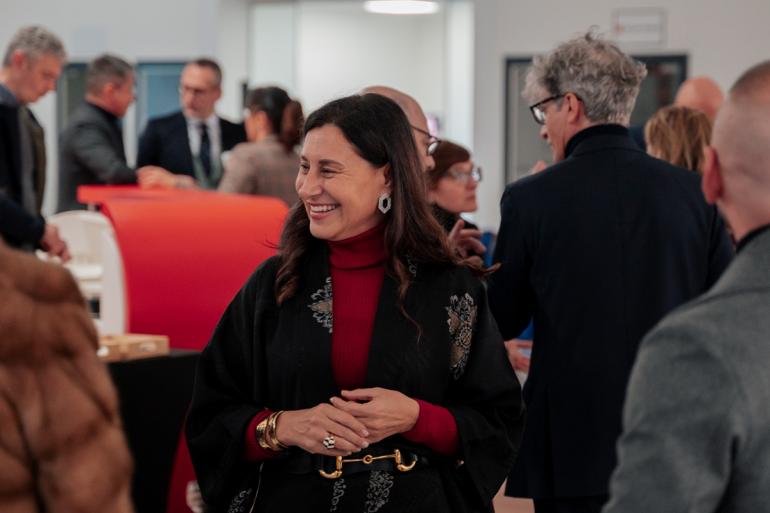CAMA: if recruitment is a question of values
A story about companies that innovate also when it comes to human resources
Maria Costanza Candi

Promoted by Cama and Omet, Tech4students is now a consolidated tradition for the world of education and the social fabric of the Lecco area, where companies aim to build a close relationship with the world of education in order to intercept talent and maintain the area's competitiveness and strong manufacturing tradition. That is why on 30 January, over 300 students, part of the 1,000 who visit Cama every year, were involved in a day of company visits organised in collaboration with Confindustria Lecco and Sondrio.
Thanks to a business culture that values social and territorial networks and feels part of them, the meeting was not lacking in institutional stakeholders who presented opportunities designed to train the young technicians of the future, intercepting interests and aptitudes that can find full expression in local companies.
On the sidelines of the 'The work of the future: key technical skills for growth' event, ItaliaImballaggio met with Annalisa Bellante, vicepresident of Cama Group with responsibility for legal affairs and human resources.
Tech4students looks after people before they even enter the company. What are your policies?
“Our aim is to create a business culture that promotes an attractive image of the manufacturing industry through the involvement of schools, public bodies and local institutions. In addition to the work and internal resources required to welcome around 1,000 young people into the company, we rely heavily on collaboration between companies in the area, with whom we build orientation paths that allow everyone to find their place in our companies, convinced that united we win. Thanks to a gentlemen's agreement, we do not compete on human resources and instead aim to create a territory that is a talent pool for the benefit of all. What prevails is therefore corporate social responsibility, based on shared values and vision, where a system strategy is put before the interest of the individual”.
Managing human resources in CAMA: can you tell us about some projects?
“Our involvement in this respect ranges from training to recruitment, from social initiatives on the ground to the gender equality focus for which we are certified. This is an issue regarding which we have many active projects, particularly with regard to shared parenting: it shouldn’t just be a woman's responsibility. Then there are parental leaves, training courses that enable an effective return from maternity and paternity leave, and part-time courses designed to foster the dual role of parents and workers: all initiatives where the person is at the centre of corporate welfare. Then there are the affiliated summer camps in the sports centre adjacent to the company or participation in social projects such as the Whp Lombardia (Workplace Health Promotion), dedicated to the promotion of healthy lifestyles in the company. Addiction is, in fact, a problem for the whole family with consequences for every aspect of daily life, including work. Family burdens should not limit career paths, but stimulate companies to look for solutions that respond to new organisational needs oriented towards a better work-life balance”.
What guides the choices of workers and potential recruits such as the young people involved in Tech4students?
“According to research commissioned by Cama and Omet, attracting new talent requires looking at motivation, which is driven by several factors. Remuneration, important for 8.4% of the sample, is followed by the company climate, considered central by 8%, training opportunities and the degree of innovation, relevant for 7.3 and 7.1% of the respondents respectively. For 49.4%, in summary, salary is not the only evaluation criterion in a working environment. Company values are central in the choice of the new generations. “That's why,” concludes Annalisa Bellante, “social projects, participation in initiatives against violence against women, but also monitoring the company climate are fundamental to retaining and growing staff in the company”.
The revolution in work is not only technological but increasingly requires soft skills. The World Economic Forum estimates that in the coming years 98 million roles will be displaced and 78 million new jobs will be created, including technical profiles, construction workers, shop assistants, teachers, labourers. How much does the relationship between technical and humanistic culture play in such a changing context?
“With digital access, information and in-depth analysis are immediate, while soft skills are more complex to acquire. This is why volunteering has been cited as an excellent gateway to the world of work, in addition to culture, family background, interaction with different contexts, training and life experiences necessary to obtain the most priceless of qualities: soft skills. In this sense, more humanism, especially in technical schools, means group management skills or activities such as debating, which teaches public speaking, which is also essential for a presentation between colleagues or with clients. In short, the digital world allows access to information, its basic processing, but it is an interdisciplinary background that brings people to a higher level of competence, which is what companies need”.



















